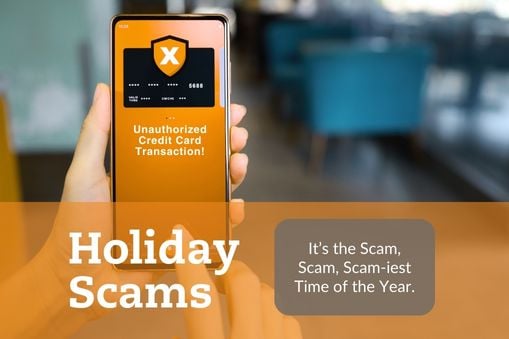Editor’s note: This is the latest entry in a yearlong series on protecting yourself against fraud. You can read additional posts about fraud here.

Let’s face it: nobody ever wants to fall victim to fraud, but if there’s a worst time for it happen, it’s the holidays. So while you’re checking the gifts off your list, here are a few important tips to keep in mind.
Protect your information. Many of the tips below are specific ways to protect your personal information, but let’s start with the most basic. Protect your information as best you can by creating unique, strong passwords (yeah, we know it’s a pain) and use a password manager to keep your information secure.
Protect your online banking username and password. Do not enter your online banking credentials anywhere except the Avadian website or app, and only when you go directly to the site. Don’t follow links to get there and don’t give it to caller claiming to be an Avadian representative. You won’t need to include it on a legit loan application either, so don’t give it to anyone requesting it that way either.
Use trusted websites. Fake websites pop up all the time looking for ways to steal your information, so make sure you are shopping on real online stores. Enter the name of the website yourself instead of following links, especially links that come from emails or texts you weren’t expecting. Look for https:// at the beginning of the web address. Click on a padlock symbol to make sure the connection is secure and the SSL certificate is valid.
Don’t shop on public Wi-Fi. If you’re out shopping and can only find what you’re looking for on the company’s website, it may be tempting to use their guest Wi-Fi to go buy it online. Don’t. It’s best to avoid logging in when using a public network.
Be wary of too-good-to-be-true deals. That ad that pops up in your social media feed offering steep discounts that seem too good to be true? It probably is, in fact, too good to be true. Seeing high-demand items at amazingly low prices is a red flag.
Watch out for phishing, smishing, and vishing. If you receive an email, phone call, video call, or text message about a fraud alert, shipping errors, or “problems with your account,” don’t click the links. If you receive a text from Avadian or another organization warning you about potential fraud on your account, call directly, entering the phone number yourself, instead of clicking links.
Fake loans. If you’re closing on a loan this holiday season, remember you will never need to give access to your financial accounts to receive funds.
Fraudulent giveaways and surveys. If you’re being asked to provide personal information in exchange for a gift, especially information like a credit card number or information about your employment, consider that a red flag. Another red flag is if you must pay a small fee to claim a prize.
Finally, as our IT people tell us, Think before you click (on a link).
